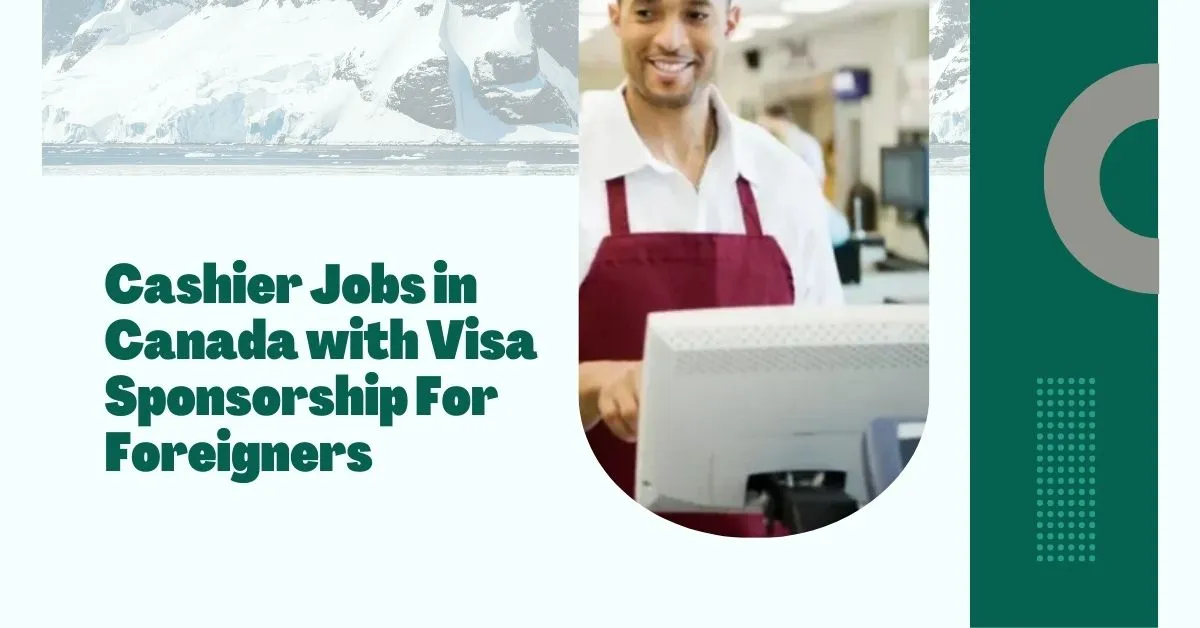
Cashier Jobs in Canada with Visa Sponsorship For Foreigners
Dreaming of starting a new life in Canada with a stable job? Many aspiring immigrants consider cashier roles because of their accessibility, minimal education requirements, and competitive wages—ranging from $15 to over $20 per hour. These jobs also offer benefits like flexible schedules, employee discounts, and valuable exposure to Canadian work culture.
But here’s the challenge: visa sponsorship for cashier jobs is extremely rare. Employers must go through Canada’s complex Labour Market Impact Assessment (LMIA) process, which is costly and hard to justify for entry-level positions.
Still, don’t lose hope. There are other pathways—such as student permits, spousal work permits, working holiday visas, and permanent residency routes—that allow foreigners to work as cashiers legally. This guide will cover everything you need
Why Visa Sponsorship for Cashiers is Rare
The primary reason is Canada’s immigration system. To sponsor a foreign worker, an employer must obtain a Labour Market Impact Assessment (LMIA). This is a process where the government assesses:
- No Canadian Available: The employer must prove they have made significant efforts to hire a Canadian citizen or permanent resident for the role but were unsuccessful.
- Wage Requirements: The offer must meet the prevailing wage for that occupation in that specific region.
- Impact on the Labor Market: The hiring of a foreign worker must have a neutral or positive effect on the Canadian labor market.
For an entry-level, low-wage position like a cashier, it is very challenging for an employer to prove that no Canadian can be found, especially in large cities. The LMIA process is also expensive, time-consuming, and complex for the employer.
Read Also: Supermarket Cashier Jobs in Canada
Realistic Pathways to Work as a Cashier in Canada
While direct sponsorship for a cashier job is rare, there are other legal pathways that allow foreigners to work in these roles:
- Working Holiday Visa (International Experience Canada – IEC):
- This is the most common way for young people (aged 18-35, depending on the country) to work in Canada temporarily.
- It’s an open work permit that allows you to work for almost any employer in Canada, including as a cashier.
- It is based on a quota system and agreements with over 30 countries. You must be a citizen of a participating country.
- Student Visa:
- International students in Canada are allowed to work up to 20 hours per week off-campus during academic sessions.
- Many students work in retail and service industry jobs, including as cashiers.
- Spousal/Common-Law Partner Work Permit:
- If your spouse or partner is in Canada on a study permit or a work permit for a skilled job, you may be eligible for an open work permit, allowing you to work as a cashier.
- Permanent Residence (PR) First, Then Job:
- Many people immigrate to Canada through programs like Express Entry, Provincial Nominee Programs (PNPs), or as sponsored spouses.
- Once they have their permanent resident status, they have full access to the labor market and can freely work as cashiers while they look for jobs in their field or upgrade their credentials.
Salary Expectations
Your figures are slightly outdated. Canada has a federal minimum wage, but each province sets its own, which is often higher.
- Federal Minimum Wage: $17.30 per hour (for federally regulated private sectors).
- Provincial Minimum Wages (Examples):
- Ontario: $16.55
- British Columbia: $16.75
- Alberta: $15.00
- Quebec: $15.25
- Experienced Cashiers/Supervisors: Can earn $17 – $20+ per hour, especially in unionized environments like major grocery stores.
Benefits
1. Stable Employment Opportunities
Cashier positions are always in demand across supermarkets, retail stores, restaurants, and gas stations. With visa sponsorship, you get legal authorization to work in Canada, ensuring a secure and steady income.
2. Competitive Salary & Extra Perks
While cashier roles are entry-level, many employers in Canada offer competitive hourly wages. In addition, you may receive benefits like overtime pay, employee discounts, health coverage, and retirement savings plans depending on the employer.
3. Pathway to Permanent Residency
Many cashier jobs with visa sponsorship can become a stepping stone toward permanent residency in Canada. Employers often support long-term employees in applying for permanent status, especially under programs like the Provincial Nominee Program (PNP).
4. Flexible Work Schedules
Cashier jobs often provide flexible working hours, making them suitable for people who want to balance work with studies, family, or other commitments.
5. No High Education Barriers
These jobs usually require only basic education and good communication skills, which makes them accessible for international applicants without advanced qualifications.
6. Skill Development
Working as a cashier helps you improve soft skills like communication, teamwork, problem-solving, and customer service—skills that are valuable in many industries if you plan to move up the career ladder.
7. Exposure to Canadian Work Culture
Cashier jobs are a great entry point for foreigners to understand Canada’s work environment, labor rights, and customer service standards. This experience can help in transitioning to higher roles later.
8. Networking Opportunities
As a cashier, you interact daily with customers, colleagues, and supervisors, which can help you build local connections and future job opportunities.
How to Apply For Cashier Jobs in Canada with Visa Sponsorship
If you are eligible through one of the pathways above (e.g., IEC, Student Visa), follow these steps:
- Target the Right Employers: Large national chains are more likely to be familiar with hiring foreigners with open work permits. Focus on:
- Supermarkets: Loblaws, Sobeys, Metro, Save-On-Foods, Walmart.
- Retailers: Canadian Tire, Home Depot, Lowe’s, Dollarama.
- Fast Food: McDonald’s, Tim Hortons, Subway (though these are often counter attendant roles).
- Use Job Portals: Indeed.ca, Jobbank.gc.ca, LinkedIn, and company-specific career pages.
- Walk-In and Apply: In smaller towns or strip malls, printing your resume and asking to speak to a manager can be very effective.
- Be Transparent:Clearly state on your resume and in interviews that you already have the legal right to work in Canada (e.g., “Holder of an open work permit valid until [date]”). This removes a major barrier for employers.
Conclusion
While the idea of an employer directly sponsoring a visa for a cashier position in Canada is a myth due to the arduous LMIA process, the opportunity to work in this role is very real through alternative immigration pathways. By targeting programs like the Working Holiday Visa or pursuing permanent residency first, you can legally access Canada’s job market. A cashier job offers more than just a paycheck; it provides a foundation for building a new life, gaining valuable Canadian experience, and integrating into the community. Your Canadian dream is achievable—it just requires navigating the right immigration pathway first.
Frequently Asked Questions
What is the minimum wage for a cashier in Canada?
It depends on the province, ranging from approximately $15.00 to over $17.30 per hour
Can a cashier job in Canada lead to permanent residency?
While the job itself is rarely sponsored, the work experience you gain while on an open work permit can be valuable points for certain Permanent Residence programs, especially if you are promoted to a supervisory role.



